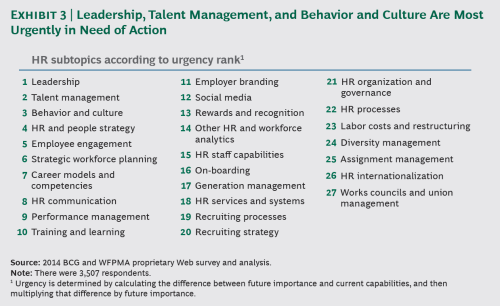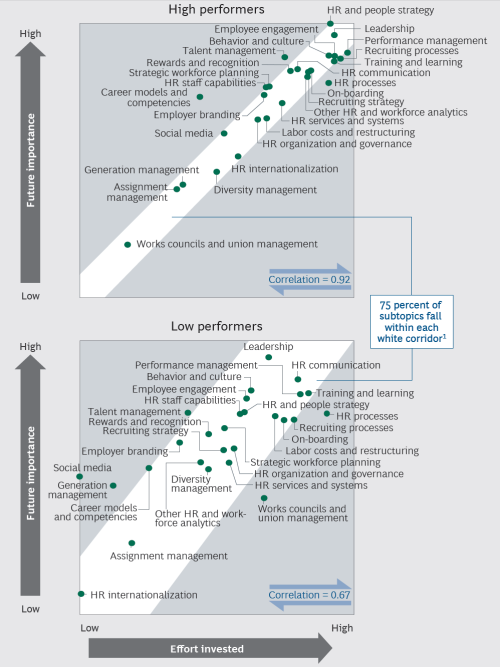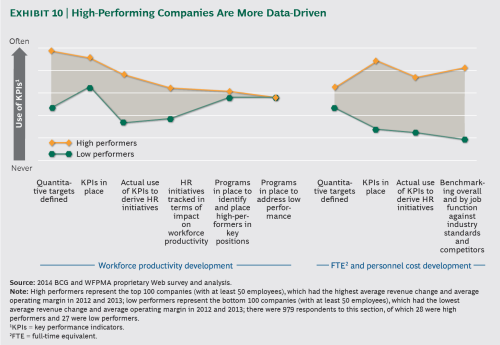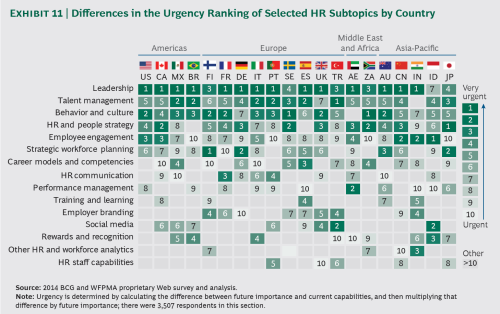
The Boston Consulting Group recently released the eighth report in their Creating People Advantage series. This year’s survey report, “Creating People Advantage 2014-2015: How To Set Up Great HR Functions: Connect, Prioritize, Impact” included responses from 3,507 people in 101 countries across industries such as industrial goods, consumer goods, and the public sector. 64 HR and non-HR executives from leading companies across the world were also surveyed. The result was a report that explores key trends in people management by considering 10 broad HR topics and 27 subtopics. Key findings from the report included the following:
- HR capabilities correlate with economic performance
- Analytics and key performance indicators (KPI’s) give HR a seat at the table
- KPI’s should link to strategic action
- Globally, leadership and talent management topics are reported as in most need of urgent action
- HR departments must be more consistent with investment decisions
- HR needs to listen more to internal clients
 An important central finding of BCG’s survey was the correlation between HR capabilities and financial performance. BCG isolated the top 100 and bottom 100 companies based on financial performance and found that organizations stronger in people management have respectively higher financial performance than those organizations without strong people management. Among these high performers no HR subtopic was reported as in need of urgent action, which directly contrasts with the organizations with the worst financial performance, which reported need for urgent action across nearly all 27 HR subtopics. BCG points out that this has been a consistent finding among their past reports as well as in publically available research, referencing the share prices over the last decade of publicly listed companies that have made the FORTUNE 100 Best Companies to Work For List, produced by Great Place to Work. The most successful people companies regularly outperform the market by nearly 100%. One offered explanation for the superior HR achievement of high performers is their strategic allocation of investment. BCG’s report found that high performers strategically allocate their efforts, making sure to accurately distinguish between high and low priorities and distributing resources accordingly. Low performing organizations had a more unreasoned approach to allocating importance and often-misaligned investments, with the level of importance not necessarily correlating to their biggest areas of investment. Organizations should make sure they have a process in place to clearly identify HR subtopics/people management practices that are most important to their organization.
An important central finding of BCG’s survey was the correlation between HR capabilities and financial performance. BCG isolated the top 100 and bottom 100 companies based on financial performance and found that organizations stronger in people management have respectively higher financial performance than those organizations without strong people management. Among these high performers no HR subtopic was reported as in need of urgent action, which directly contrasts with the organizations with the worst financial performance, which reported need for urgent action across nearly all 27 HR subtopics. BCG points out that this has been a consistent finding among their past reports as well as in publically available research, referencing the share prices over the last decade of publicly listed companies that have made the FORTUNE 100 Best Companies to Work For List, produced by Great Place to Work. The most successful people companies regularly outperform the market by nearly 100%. One offered explanation for the superior HR achievement of high performers is their strategic allocation of investment. BCG’s report found that high performers strategically allocate their efforts, making sure to accurately distinguish between high and low priorities and distributing resources accordingly. Low performing organizations had a more unreasoned approach to allocating importance and often-misaligned investments, with the level of importance not necessarily correlating to their biggest areas of investment. Organizations should make sure they have a process in place to clearly identify HR subtopics/people management practices that are most important to their organization.
HR leaders looking to have “a seat at the table” for strategic discussions within their organizations must demonstrate the business impact of HR, providing executive management with quantitative evidence of how HR supports business strategic decisions. BCG’s research finds that organizations using people-related Key Performance Indicators, or tools such as simulations and forecasts, have greater strategic roles in their organization than companies that don’t utilize such tools. Such tools allow HR functions to measure and analyze areas such as employee productivity and people costs. 
Simply put, HR functions that do not use metrics and analytics cannot play a strategic role in their organization, and furthermore, perpetuate the stereotype that HR functions should, or are better suited to work with, softer aspects of human capital management.
BCG looked at responding organizations’ perceived importance of 27 HR subtopics by region and industry, using an urgency metric to better understand those with the most need for action. In the majority of countries leadership was ranked (by a wide margin) as the most urgent subtopic, followed by talent management. Beyond these two subtopics, importance varied considerably by region. In the U.S, behavior and culture, along with employee engagement, ranked as more urgent than in most other countries. When breaking subtopics down by industry importance, the results were similar, with leadership, talent management, and behavior and culture ranking as most urgent across the majority of industries.
 Ultimately, BCG’s report highlights three hallmarks of a great HR function that prove as critical differentiators between high and low performing organizations:
Ultimately, BCG’s report highlights three hallmarks of a great HR function that prove as critical differentiators between high and low performing organizations:
- Connect – clearly linking HR and people strategies with business strategy
- Prioritize – identify most urgent priorities and invest resources accordingly
- Impact – generate and report people-based KPI’s, providing data to formulate strategic actions
Organizations that can collectively institute all three ideas create HR functions that we can describe as “best in class.” The real question to be answered, though, is “which comes first, best in class HR or strong economic performance?” If you’re in HR, I know what I hope your answer is!




